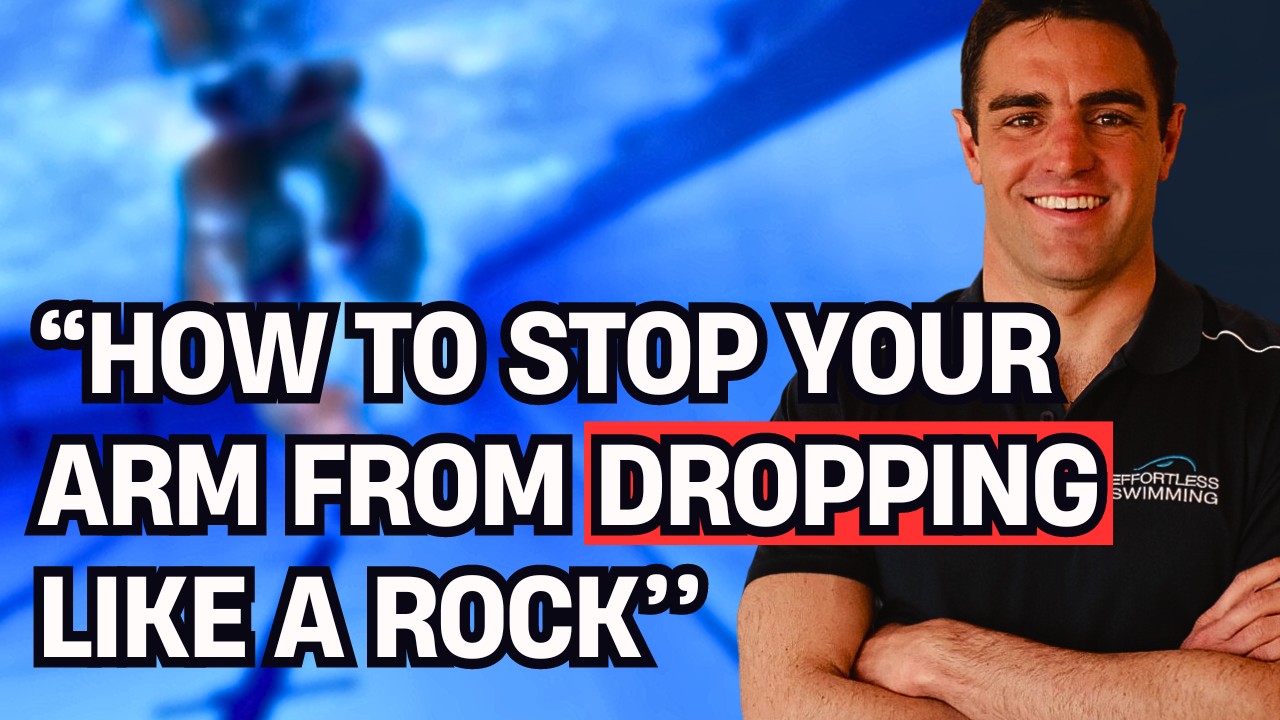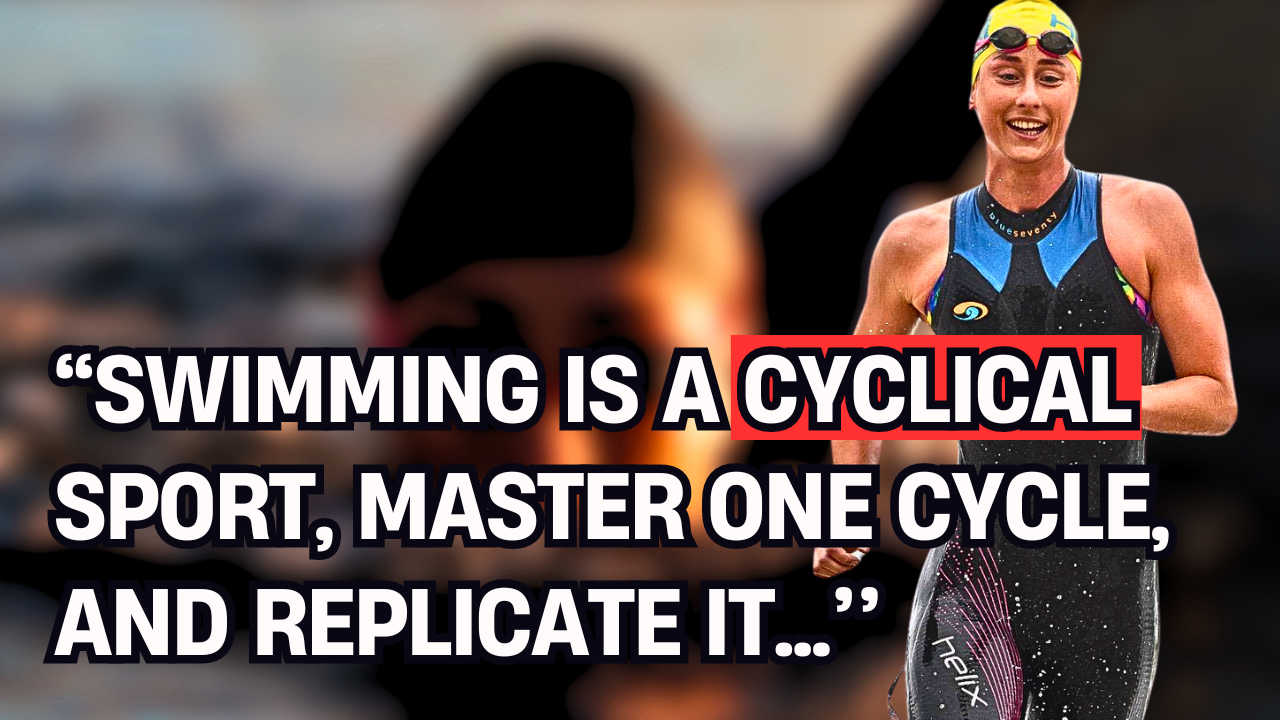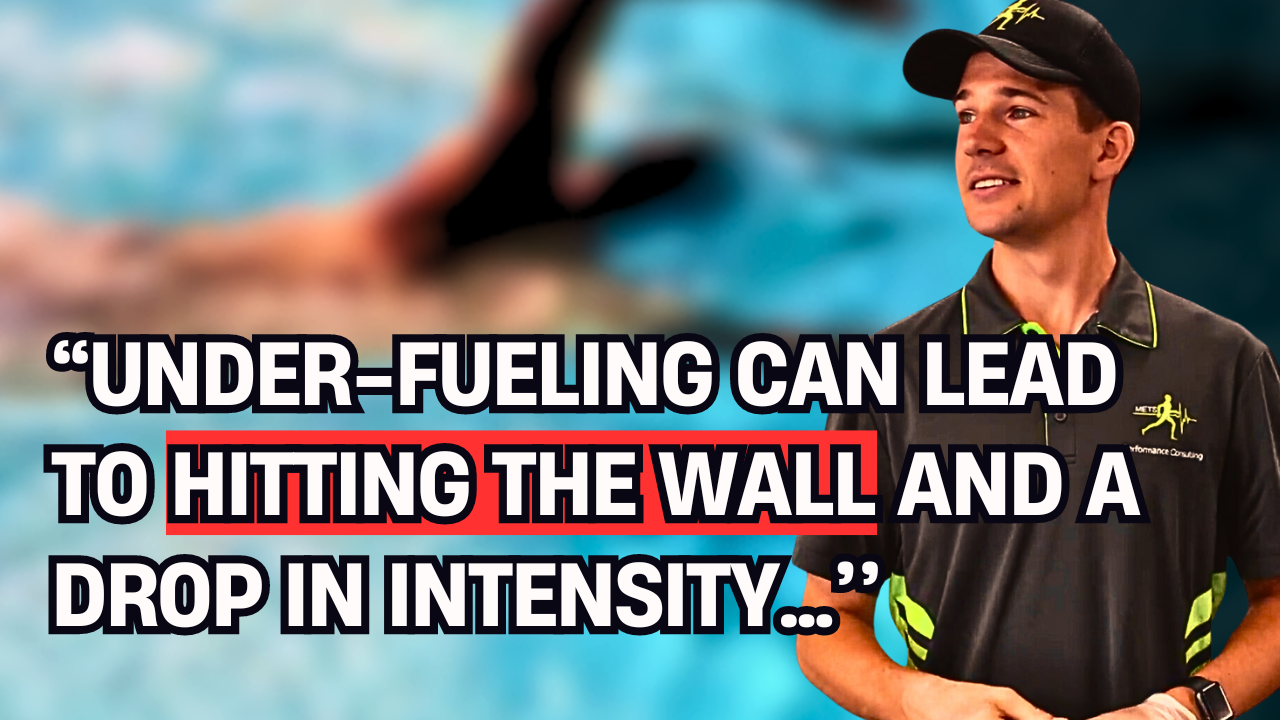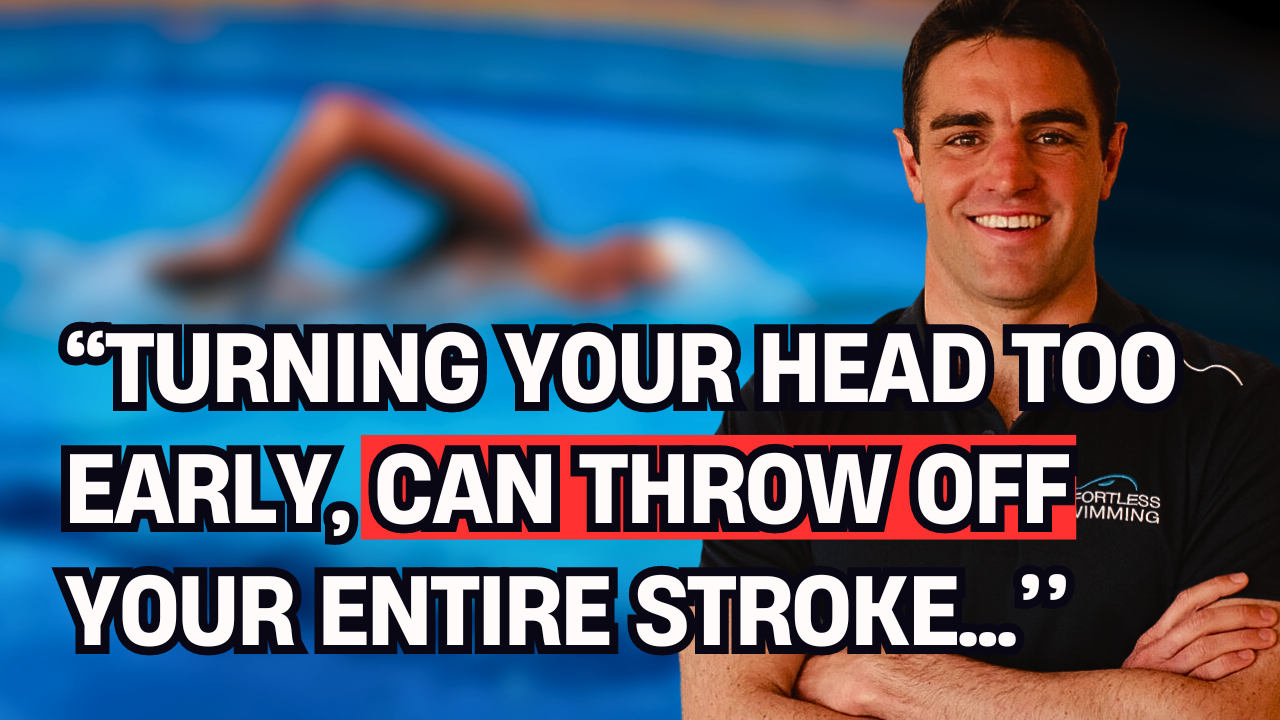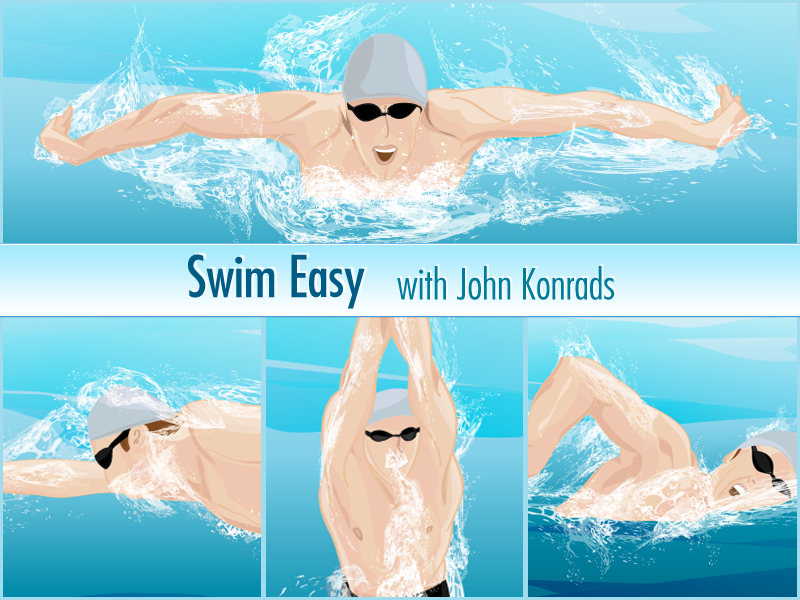We’re back for round two for the second podcast with my favourite nutritionist, Steph Lowe of TheNaturalNutritionist.com
Today we’re talking about the two big misconceptions about food. I’ve made some changes to what I eat lately based on misinformation I learnt when I was in school. Let’s get into it.
Brenton Ford: Welcome to another episode of the Effortless Swimming Podcast. I’m here with my favourite nutritionist; I’ve got Steph Lowe on the line again. Steph is a friend of mine, here from Melbourne. She’s a triathlete and she’s about to head off to Hawaii for a half-ironman over there, but today I want to talk to Steph about two big misconceptions about food. And the reason I’m going to talk about these two things is: I’ve made some changes to my diet recently and the results from that have been good. So I want to talk to Steph about why these misconceptions are out there and what it can mean to your health and your weight if you make these changes in your diet.

So welcome again to the podcast, Steph.
Steph Lowe: Hi, thanks for having me.
Brenton Ford: So, the two misconceptions I want to talk about are: The first one’s about fats in the diet. So lately, I’ve been having a lot more fat in my diet but my weight hasn’t been increasing; in fact it’s been going the other way. So, let’s talk a little bit about the misconception about a lot of the fats that people generally eat.
Steph Lowe: I think that’s actually the most common misconception that we have. I guess it’s important to start by discussing that we actually need to consider that it’s not food that controls our weight, but it’s our hormones. So what we’re looking at from a food perspective is eating the right food to get the desired hormonal control or impact. Fats in particular are really complex molecules; they have a high what we call “thermic effect of food,” but that just means that our body has to go through a lot of work to digest and assimilate and absorb which is actually a good thing because it gives us that satiety; and I know that you mentioned you feel full when you eat those good fats. So you do get that satiety which is obviously really important, but from that hormonal point of view we get blood sugar control so we don’t get the high spikes in insulin which is what sugar or refined grains give us. We get a nice stable energy supply and that’s what a meal should do – it should offer us that energy delivery into the morning or into the afternoon or, if it’s a main meal, certainly that energy value.
Brenton Ford: One of the things that I’ve noticed; basically what I’ve been doing for breakfast: I’ve been having bacon and eggs with butter and with another thing called MCT oil. And what I’ve noticed is that I’m not really getting hungry until about one or two o’clock in the afternoon; but even then I’m not as hungry as I was when I was eating say cereal for breakfast. So another thing is that energy delivery; so how are fats different to carbohydrates in terms of energy delivery? Is there one which is better?
Steph Lowe: There are a couple of points there we can discuss. If we look at our traditional breakfast options – cereal and toast – they’re really high in carbohydrates which, at the end of the day, are just sugars so the carbs get broken down into the sugars. What those sorts of foods do is give us short term energy, a big insulin spike, and then we come down off what we call a rollercoaster and that’s when you get the crash and also the hunger. So you’ve probably experienced it before, that you eat your cereal and toast and by nine o’clock, you’re craving a muffin or some caffeine to pick you up from that sugar crash. The opposite happens when you eat fats and protein which you are obviously getting from your eggs and bacon as well as the good fats, so both protein and fats give you that delayed energy delivery because they are more complex molecules to break down and our body doesn’t require insulin like it does when we eat carbohydrates.
Brenton Ford: I know on your website, TheNaturalNutritionist.com.au, you quite often talk about the difference between butter and margarine. So one of them is good for you; one of them is not so good for you. What’s your take on those two?
Steph Lowe: Definitely, butter is the best choice and we now know why. Margarine was invented back in the low fat era where everyone became really fatophobic and low fat products became the next best thing. I think the perspective I can give you is: If you look at the number of ingredients in butter there’s going to be two – maybe three – versus the number of ingredients in margarine is definitely fifteen or more. I’m not sure if you’ve ever seen the colour of margarine before it’s dyed to be sellable. It’s actually like a really foul grey-looking colour because it’s been highly processed. And I think you need to ask yourself whether you want to put that inside your body.
Brenton Ford: One thing that annoys me, but it’s good marketing by the margarine companies, is a lot of big claims are “lowers your cholesterol” and they make it sound like it’s really healthy to eat margarine; are those claims true? Or is it funded by the margarine companies, those studies?
Steph Lowe: Those claims aren’t true. I think the most important point is that we can’t be victims to food marketing. It’s really important to learn how to read labels and look at the ingredients list and certainly learn to avoid those unsubstantiated claims. Margarine – they can get away with saying that because of the omega 6 content. People assume all omegas are good but we know that it’s actually just omega 3 that we want from a heart health and cholesterol point of view. And margarine is actually high in omega 6 which is actually inflammatory so it’s something we need to be avoiding for overall health, but from an athlete point of view, particularly from a recovery point of view, we want to be as anti-inflammatory or as alkaline as possible.
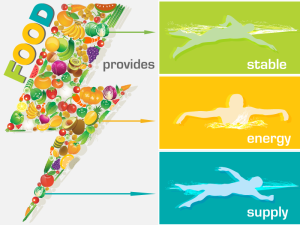
Steph Lowe: Well, this comes back to what I think happened – it started over 50 years ago now with a certain few research studies that were very much manipulated in terms of what the data set produced. I think, back then, we didn’t have any other evidence to go on so those research studies bled into the food industry and then products were created and we were just pretty much told what to believe. It’s a very different story now; we have a lot more research and longitudinal studies that obviously, when it’s done over a long period of time, you can get some decent evidence. We now know that we are not linking saturated fats to heart disease and cholesterol and there’s actually something called the “Saturated Fat-Heart Disease” myth because it’s obviously been disproven.
Brenton Ford: It’s quite interesting, a lot of this stuff that we’ve been taught in the last two decades or so with all these low fats and all these changes. But even with milk you’ve got skim milk and 99% fat free milk, but are you better off just having the full cream – the normal milk – as opposed to skim milk?
Steph Lowe: Definitely. I mean, we’re looking at blood sugar control so if you have a little bit more fat in your dairy in general, then that’s going to give you that energy, that satiety, that blood sugar control which is the key to weight management. The perspective I can give you is: You don’t want to change things from their natural state so at least full fat dairy is close to how it comes out of the cow whereas skim milk has gone through a large range of processing to get it to be cholesterol free. And that’s another one similar to margarine – it’s actually a really foul colour before it’s dyed to be marketable.
Brenton Ford: What about for the coffee drinkers out there? You know, soy is marketed as the healthier option to milk but, based on what I’ve been reading, soy milk’s not the greatest thing to be having either.
Steph Lowe: I think we need to think about milk in general; I mean, soy milk is usually really high in sugar to start. We know that we want to avoid inflammatory foods, and sugar is certainly one of the big culprits. To be honest, I don’t think we need dairy at all, whether it’s full fat or not, purely because we want to think about food giving us nutrition that we need and, unfortunately, the dairy that most of us have access to is pasteurised and obviously that has to happen at some level to be in the actual supermarket, but what it means is that most of the nutrition is actually destroyed. So the question I always ask people is, “Why would you want to drink something that’s not providing you with any nutrition?”
Brenton Ford: That’s right. What do you recommend for coffee drinkers then? How do you recommend they have their coffee?
Steph Lowe: I actually use unsweetened almond milk for my coffees. Most of my clients end up doing the same thing with a little bit of a twist of the arm but you can always go for a long black or, if you want to reduce your dairy intake to start, obviously something like a macchiato or something with a lot less dairy is the best place to begin.
Brenton Ford: That’s something I’ve been wondering, because I drink probably more coffee than I should, and how do you reduce that milk intake while still having your coffee?
Steph Lowe: It comes back to blood sugar control as well, whether it’s full fat or skim, milk will always have the 4.7 g per 100 g of lactose which is the milk sugar. So if you’re having a 200 mL cup of coffee, you’re nearly getting 10 g of sugar. Then if you’re multiplying that by two or three a day, you’re having more than your day’s intake in your liquid, and that sugar is giving you that insulin response and that’s the opposite of what we’re trying to achieve, remember.
Brenton Ford: Yeah, that’s it. That kinda ties into the second misconception that I want to talk about and that’s with wheat or with gluten. I’ve read – or I’m in the middle of reading – a good book called Wheat Value which I think I might’ve seen you recommend on your Facebook page, but it’s just really interesting as to the changes that wheat’s gone through over the last 50-60 years and how it’s so different to what it used to be in terms of it’s been genetically modified and changed to be able to cope with different weather conditions and things like that. You’ve been gluten free for how long now?
Steph Lowe: I’m coming up to eight years actually.
Brenton Ford: Eight years. And you haven’t looked back in eight years?
Steph Lowe: It’s been a good journey. I mean, to be honest, I think it comes back to where we get our nutrition from and like you mentioned, the wheat these days is really processed, it’s hybridised to create big yields, so it’s all about the dollar at the end of the day. Refined grains are also really high in phytic acid or phytates, and what that means is that these compounds in particular really inhibit nutrient absorption. And the reason why you would go wheat free and/or gluten free is to remove a high phytate content and to allow your body to absorb nutrients better.
Brenton Ford: I’ve been on holidays the last two weeks and I completely went the other way, but before that I was not having any wheat or gluten for a couple of weeks and it felt really good. I felt like I was able to think clearer; I felt like my hunger wasn’t as much as it used to be so I didn’t really get the cravings I used to from it. So I’m back on that ‘diet’ so to speak, and avoiding wheat and avoiding gluten as much as possible because I think it’s such a good way to go after looking at all the recipes on your website and things like that. You know that I follow them almost religiously with your recipes on there; that there’s a lot of good food out there that you can have that you don’t need to have gluten or wheat in your diet.
Steph Lowe: You certainly don’t. And I think an important point is that if you’re filling up on those sorts of foods, it’s highly likely that you’re not getting adequate nutrition from protein and vegetables. If you think about a meal that might be high in wheat or gluten – the standard would be say pasta or pizza – you’re never going to get a full serve of protein or cups of veges in those sorts of meals unless you’re really creative. So if you reduce your reliance on those cardi grains, it allows you to fill your plate with good protein which is really important for lean muscle mass development and also exercise recovery and it also allows you to meet your daily vege requirements. And vegetables are really where we get all of our antioxidants and nutrients, vitamins and minerals, so we can’t allow the really complex carbs to get in the way of that intake.
Brenton Ford: You’ve got a high performance weight loss program for athletes and a lot of this stuff that we’re talking about now ties into that. Can you explain to me how that program works, and how do the athletes that go through your program get those results with the stuff that you do?
Steph Lowe: I help people first understand why we’re making these changes and it really depends on where the athlete is starting from. So my high performance weight loss program is very tailored. We start with an initial consultation and generally focus on day-to-day nutrition, so make those changes over the course of a few weeks so they’re obviously sustainable. Then we also tie in some exercise nutrition as well. Obviously the priority is what you do most of the time – that’s the day-to-day stuff – and then we look at how we can get the most out of your training, and nutrition is a big element of that. So we work together with follow-up consultations that might go fortnightly or monthly, moving out to say a six month catch-up to make sure that everything’s in check, and then, obviously, our plan is now integrated as part of their lifestyle.
Brenton Ford: And that’s the big thing too because with the people who switch from diet to diet, it’s not a sustainable way of losing weight, is it?
Steph Lowe: Absolutely, I think you’ve hit the nail on the head there. I don’t really like to use the ‘diet’ word at all because it means a short term approach. So you want to find the changes and they might be completely new to you so there’ll be an adjustment phase but that’s also completely normal and there’s certainly a way to make gradual changes each week that then accumulate, and then in say eight weeks time or twelve weeks time, it’s definitely part of what you do. But you’ve learned that like you would learn any new skill – like you would learn how to do butterfly. You learn how to integrate these new nutritional guidelines into your life.
Brenton Ford: That’s exactly right. If you want to change your freestyle technique you start with one part of it, it might be your body position for example and you focus on that, you get that right for a couple of weeks, you make the change and then you move on to the next thing. So it’s sort of integrated into your stroke just like you’d implement these small changes one at a time into your lifestyle and your habits and things like that.
Steph Lowe: Absolutely, and that’s the way it becomes sustainable. I almost feel like then it becomes integrated in your DNA. It’s what you do without thinking twice.
Brenton Ford: One of my favourite changes that I’ve made lately is: On a Sunday night I’ll cook up a big meal that I’ll have for either lunch or dinner for the next couple days after that and it’s just stopped me from snacking; it’s stopped me from looking in the cupboard and the fridge multiple times a day for something to eat. So I’ve just got that food there so it not only saves time, but it just means you’ve got something you can go straight to when you’re hungry.
Steph Lowe: Yeah, I think food prep is a big part of it, particularly if you’re trying to fit in full time work and training. Healthy food doesn’t appear on the table by itself, so a little bit of prep goes a long way, so whether it’s snacks to have in your training bags so you can eat as soon as you’ve finished to help accelerate recovery, or if it’s a big meal that you cook a double or a triple batch of so that you’ve got something to take for lunch the next day, or even chuck it in the freezer for later on in the week when you’re home late from training; it really sets your week up for success.
Brenton Ford: My favourite recipe from your website is the spinach bread you’ve got on there. I know you’re making a banana bread one too soon. So what I do on the weekend is make up the spinach bread, cut it up into a couple slices – it might go to eight or ten slices – wrap up each one individually, put it in the freezer and then you can take that along to training to have afterwards. That’s stopped me from stopping off at the supermarket on the way home from training and buying… two years ago it used to be a packet of doughnuts and a block of chocolate.
Steph Lowe: Not exactly the perfect recovery fuel is it?
Brenton Ford: No, not at all, but when you’re hungry and you haven’t eaten for a while and you’ve had a big training session, that was my go-to recovery snack, but I was 6 kg heavier then. And that’s why.
Steph Lowe: And that’s why snacks in the training bag are a really good one so you do make the right choice. But remember we want to be eating some proper fuel in that 30 minute window post exercise; if you’ve got to drive home or go to the grocery store or start cooking, I guarantee you’re going to miss that window, so even something like a banana in your training bag is a great place to start, but you can certainly cook one of my muffin or bread recipes which are all gluten free and refined sugar free and that’s a great snack to have ready to go.
Brenton Ford: Sounds good. And now with protein, you recommend the pea protein. So why is that, and what’s the difference between that and say whey protein?
Steph Lowe: Personally, I’ve just moved away from dairy just because we know that dairy is an inflammatory nutrient. If we’re looking at being as alkaline or as anti-inflammatory as possible, it’s not something that we need to rely on. There are some good quality whey protein isolates out there which obviously have the dairy element removed but personally, I just chose the pea protein because it’s obviously really natural – which is what I do with everything I put in my mouth – and the pea protein I find it’s cost effective and it tastes good but it’s also highly bio available so you’re getting that protein straight in after training.
Brenton Ford: I haven’t tried it yet, but once this batch of protein runs out, I’m going to give it a shot. If people want to find out more about more recipes or if they’re interested in your high performance weight loss program, whereabouts can they go and find that information?
Steph Lowe: Easiest place is online, so it’s thenaturalnutritionist.com.au. Recipes are up on the blog on the homepage, but there’s also quite a lot on Facebook so jump over to Facebook and like The Natural Nutritionist.
Brenton Ford: Awesome, thanks for that. And you’re off to Hawaii on Friday?
Steph Lowe: I am. I fly out on Friday and I race the half-ironman next week on Saturday the 1st of June.
Brenton Ford: Sounds good, well good luck.
Steph Lowe: Thank you.
Brenton Ford: I hope you go well, and thanks so much for jumping on the podcast again. It’s always a pleasure to have you. And, as you know, I follow your recipes religiously online so I’ve shared a lot of the things that you post on the Effortless Swimming Facebook page because it’s really good stuff and it’s really good for athletes I think. So thanks again and I’ll hopefully see you back on the podcast sometime soon.
Steph Lowe: Great, thanks for having me Brenton. Bye.









